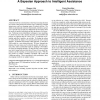Free Online Productivity Tools
i2Speak
i2Symbol
i2OCR
iTex2Img
iWeb2Print
iWeb2Shot
i2Type
iPdf2Split
iPdf2Merge
i2Bopomofo
i2Arabic
i2Style
i2Image
i2PDF
iLatex2Rtf
Sci2ools
109
click to vote
IUI
2006
ACM
2006
ACM
Who's asking for help?: a Bayesian approach to intelligent assistance
Automated software customization is drawing increasing attention as a means to help users deal with the scope, complexity, potential intrusiveness, and ever-changing nature of modern software. The ability to automatically customize functionality, interfaces, and advice to specific users is made more difficult by the uncertainty about the needs of specific individuals and their preferences for interaction. Following recent probabilistic techniques in user modeling, we model our user with a dynamic Bayesian network (DBN) and propose to explicitly infer the “user’s type”—a composite of personality and affect variables—in real time. We design the system to reason about the impact of its actions given the user’s current attitudes. To illustrate the benefits of this approach, we describe a DBN model for a text-editing help task. We show, through simulations, that user types can be inferred quickly, and that a myopic policy offers considerable benefit by adapting to both dif...
Related Content
| Added | 14 Jun 2010 |
| Updated | 14 Jun 2010 |
| Type | Conference |
| Year | 2006 |
| Where | IUI |
| Authors | Bowen Hui, Craig Boutilier |
Comments (0)

